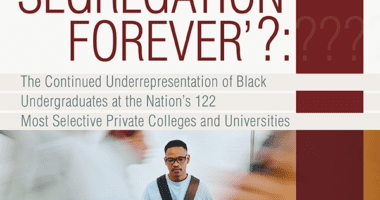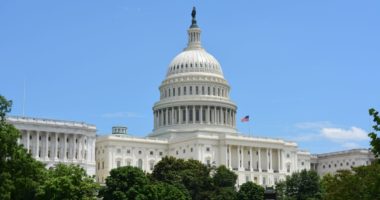Even Before the End of Affirmative Action, Latino Students Have Been Under-Represented at the Nation’s Most Select Colleges and Universities
FOR IMMEDIATE RELEASE
Contact:
Ameshia Cross
across@edtrust.org
New EdTrust report shows that very few Latino students are enrolled in private institutions
WASHINGTON— On the heels of the United States Supreme Court decision upending affirmative action in higher education admissions, the nation has been inundated with a wave of anti-DEI and anti-immigration actions. No doubt these policy aggressions have had a negative effect on Latino students. So, what is the responsibility of university leaders to ensure effective recruitment and retention of Latino students? How can the nation’s top universities best serve Latino college students? A new EdTrust report seeks to answer these questions and more.
“Segregation Forever? The Continued Underrepresentation of Latino Undergraduates at the Nation’s 122 Most Selective Private Colleges and Universities,” the comprehensive report released today, is another chapter of the series of EdTrust research that sheds light on the enduring under-representation of undergraduate students of color in the nation’s most selective private colleges and universities. This report examines the ongoing challenges faced by Latino students in accessing higher education opportunities. According to EdTrust’s policy analyst and report author, Sandra Perez, “Institutional leaders and policymakers must address historical inequities and systemic barriers in all levels of higher education. This report shows that despite being the fastest growing demographic since 2000, Latino students have lacked access to some of the country’s most prestigious institutions. Failure to address the historic exclusions of these marginalized communities at elite universities will have a collective impact on our nation’s social and economic prosperity.”
Through an analysis of enrollment data and access scores that look at the years 2000 and 2022, well before the end of affirmative action, EdTrust research reveals slow progress in diversifying student bodies, with most institutions still failing to adequately represent Latino populations. Recommendations for campus leaders and policymakers emphasize the need for concerted efforts to improve access and address systemic barriers hindering Latino student enrollment and success in these institutions.
“Amid a climate of unprecedented anti-immigrant and anti-Latino sentiment, we must have a new resolve to go further to achieve equity in higher education. This EdTrust report, in conjunction with our own brief, outlines what selective colleges and universities must do to ensure access and support for Latino students, despite the Supreme Court’s disappointing decision last year. This is important not only for the Latino community, but for our nation’s future,” said Amalia Chamorro, director, Education Policy Project, UnidosUS.“
Key recommendations outlined in the report emphasize the imperative for concerted efforts among campus leaders and policymakers to dismantle barriers and create pathways for Latino student enrollment and success. These recommendations include but are not limited to:
- Developing recruitment strategies that increase access
- Improving campus racial climates
- Leveraging federal accountability
- Increasing accountability from accreditors
At a time when the nation is grappling with pressing issues of equity and access in higher education, the findings of this report serve as a national call for decisive action. The onus lies on campus leaders, policymakers, and advocates to confront systemic barriers and foster environments that champion diversity, equity, and inclusion for all students.
###
About EdTrust
EdTrust is committed to advancing policies and practices to dismantle the racial and economic barriers embedded in the American education system. Through our research and advocacy, EdTrust improves equity in education from preschool through college, engages diverse communities dedicated to education equity and justice, and increases political and public will to build an education system where students will thrive.




